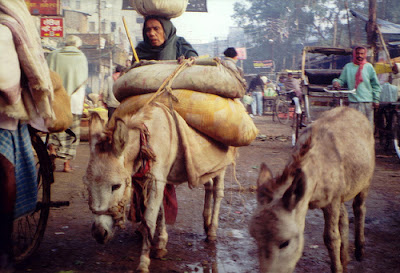Ethical Consumerism: Making a difference from home
A version of this article was first published on the Development in Action Blog.
Development in Action
Development in Action (DIA) is a charity that encourages young people to take an interest in global issues and promote global citizenship, and every year it sends volunteers to NGO's in India on 2 and 5-month placements, and it's currently recruiting! However, if like me you are not currently in a position to embark on this kind of volunteer work, what can you do?
Fortunately, there are other ways of taking action and exercising global
citizenship that don’t involve leaving your home country, such as donating
money to a development charity or volunteering in the UK. And there are even
simple everyday actions you can take, such as choosing to buy one particular
bag of sugar over another. That’s because the consumer choices you make can have
a global impact, and it’s important to know how. So here is my list of five
things that you could consider doing to become a more ethical consumer:
Development in Action
Development in Action (DIA) is a charity that encourages young people to take an interest in global issues and promote global citizenship, and every year it sends volunteers to NGO's in India on 2 and 5-month placements, and it's currently recruiting! However, if like me you are not currently in a position to embark on this kind of volunteer work, what can you do?
 |
| While some urban centres in India are highly developed, much of the country is still characterised by extreme poverty. Photo: Flikr/Ahron de Leeuw |
1. Buy fairly traded goods
The Fairtrade mark on consumer goods is a
sign that producers in developing countries have been paid a fair price for the
raw materials. Fairtrade products must also meet international
standards by, for example, not using child labour, allowing workers to negotiate
fair wages collectively and by ensuring that the work is not hazardous to their
health.
The good news is, it’s getting easier to
buy Fairtrade all the time. For instance, 2012 is set to be the year when Fairtrade
sugar accounts for more
than 50% of all sugar retailed in the UK.
2. Choose ecological
products
Climate change and other global
environmental issues have a huge effect on the poorest countries, as they often
already live in harsh climates and do not have the resources to cope. In this
context, you should consider the environmental impact of things like your
electrical appliances, washing powder and travel providers.
3. Eat less meat
On the subject of the environment, one change
you can make to help prevent climate change and increase the world’s capacity
for food production is to base more of your diet on plants rather than animals.
That’s because rearing animals is much more land and energy intensive than
growing crops, and produces
more greenhouse gases than cars.
You don’t need to become completely
vegetarian to make a difference, as the Part-Time Carnivore
website explains. Only eating meat every other day, or only on Sundays, lowers
your CO2 emissions and the amount of land required to grow your
food. I give up meat every year for Lent - could you do something similar?
4. Boycott unethical companies
As well as choosing products that support
the world’s poorest, some consumers choose to boycott companies that they
believe are exploiting people in developing countries, such as through sweat
shops and child labour. One of the longest-running and most famous boycotts is
against Nestlé, because of its marketing of baby formula. Such boycotts are
often controversial, however, so it is definitely worth checking the facts if
you are thinking about taking this kind of action.
5. Change to an ethical
bank account
The financial industry played a huge part in
creating the current global economic crisis, and questions are increasingly
being raised about how much bankers are paid and the risks they take with other
people’s money.
What often isn’t mentioned is whether banks
make investment decisions based on ethical considerations. For instance, do you
know if your bank invests in arms companies or projects involving deforestation
or pollution? Such projects can have a devasating impact on development, and that's why I recently changed my account to the Co-operative Bank. If you
want to find out more, ethicalconsumer.com has a guide to
responsibly choosing a bank account.
You are not alone!
You might think that one person is
not going to make much difference, but if many people change their habits
together, the impact is huge. And a recent Ethical Consumerism Report from the
Co-operative Bank shows that, despite the recession, the ethical market grew 18% from 2007 to 2009,
so you’d be in good company! And if you spread the word too, maybe this trend
will continue.
Links:


Comments
Post a Comment